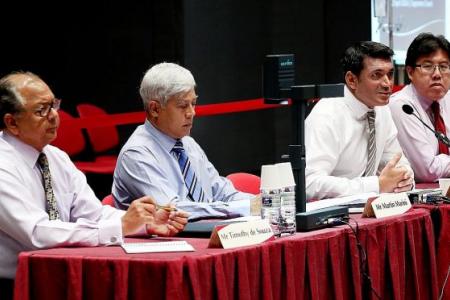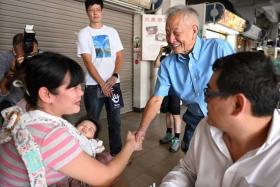Lawyer: CPA can take over President's custodial powers
The Constitutional Commission received over 100 submissions on the review of the elected presidency. The Eurasian Association, a group of law students and three lawyers clarified their submissions in a public hearing at the Supreme Court yesterday.
THE EURASIAN ASSOCIATION
Mr Timothy de Souza, trustee, Mr Martin Marini, honorary treasurer, Mr Benett Theseira, president, Dr Alexius A. Pereira, vice-president
To ensure minority representation, the self-help group suggests a Group Representation Constituency (GRC) style of process, where a team runs with two or three members.
The front runner would be the President while the other members would be appointed to the Council of Presidential Advisers (CPA). It could be a requirement for the leader of the team to be a minority once every three elections if a minority has not been president for the past two terms.
In response to commission member Chan Heng Chee's concern that this GRC system is a form of "closed minority election", Mr Theseira argued that this approach would dilute the impact of possible unhappiness if people were forced to vote for a minority candidate. It would also prevent competition among the different minorities.

SINGAPORE MANAGEMENT UNIVERSITY
Second-year law students (from left) Mr Mok Zi Cong, Mr Mohamed Arshad Mohamed Tahir, Mr Ko Yuen Hyung, Mr Alexander Lee
The undergrads think the criteria of those appointed to the CPA should be adjusted to recognise their role of providing specialist advice.
They suggested the CPA to be restructured into three units - legal, financial and appointments - that mirror the role of the President.
They noted that the current eligibility criteria is low, and those who have been appointed into the CPA so far "exceed the criteria by quite some distance". (See report above.)
For the purpose of transparency, they suggested advice rendered by the CPA to the President to be published in the government Gazette.

MR REY FOO
Lawyer
Noting the "political-style" campaigns of the last presidential campaign, Mr Foo thinks an ad hoc tribunal is needed to ensure that candidates refrain from making "grandiose promises to get the populist vote", which would give rise to wrong expectations about the role of the elected President.
The tribunal could include a judicial officer, or be a part of the Presidential Elections Committee. Any member of the public or a presidential hopeful can raise a complaint to the tribunal.
"The election process for an elected President should be of an entirely different flavour compared to a normal general election for Parliamentary seats. The office of the elected President has limited powers enshrined by the Constitution," Mr Foo said.

MR RANVIR KUMAR SINGH
Lawyer
Currently, a candidate from the private sector must have served no less than three years as chairman or chief executive of a company with a paid-up capital of at least $100 million, or any other comparable position of seniority. Mr Singh thinks the qualifying threshold for companies should be updated as the economy evolves.
He suggests the paid-up capital requirement be increased to $500 million, citing Singtel as the benchmark, whose paid-up capital has increased about five times from 1993.
This is also reflected in Central Provident Fund balances, which has risen five times since the 1990s.
Qualitative criteria should also be considered. These include net tangible assets (to be set at $1 billion), substantive business operations, and profitability requirements, so the size of the company would not be the only factor considered.

MR RONALD WONG
Lawyer
He suggests a system where the CPA votes for a President themselves.
The six-member CPA - which would be required to have minority representation - would consist of two elected members, two selected by the Prime Minister, and one each selected by the Chief Justice and the head of the Public Service Commission.
The appointed President will have a ceremonial role, and using the President's custodial power would be exercised by a majority vote among the remaining five CPA members.
Mr Wong also argued there will be sufficient checks on the Government as there would be two elected CPA members and two CPA members appointed by independent key office holders.
About the CPA
Prospective nominees for the six-member Council of Presidential Advisers (CPA) must be Singapore citizens aged 35 and above who reside here.
They must also not be of unsound mind, insolvent or undischarged bankrupts, or have been convicted by court and sentenced to a jail term exceeding one year or a fine above $2,000.
The CPA comprises six members and two alternate members.
Two members are appointed by the President at his discretion, two are the Prime Minister's nominees, one is the Chief Justice's nominee and one is the nominee of the chairman of the Public Service Commission.
CPA proceedings are private.
The President must consult the CPA in the exercise of any of his discretionary powers in connection with appointments and the reserves.
Get The New Paper on your phone with the free TNP app. Download from the Apple App Store or Google Play Store now




